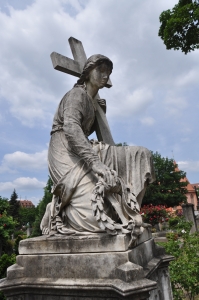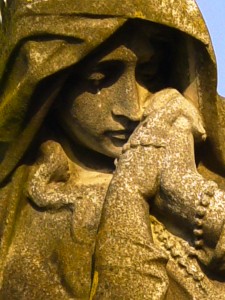 Last blog, I name dropped.
Last blog, I name dropped.
Did you catch it? I said my friend, Father Stanley Rother helps me walk the path to Heaven.
Actually, that’s Blessed Father Stanley Rother to you.
Allow me to introduce you.
Father Rother isn’t a saint–yet. But he is a martyr, which gives you a big boost on your road to sainthood. In fact, he was just beatified on September 23rd and my daughter and I were there.
He’s the first american born martyr. And while he was growing up, no one ever thought he’d be a saint one day.
See, he was a simple man, an unassuming man, an Oklahoma farm boy who failed Latin in seminary, who had to have the bishop intervene so that he could finish seminary.
Who had a heart for missions and joined his diocesan mission to Guatemala.
And it was there that he found his true calling and his true heart. He became immersed in the life of the people. He learned two languages, the native dialect (Tz’utujil) and Spanish. In fact, he translated the new Testament and learned to say Mass in the native dialect. This from the boy who failed Latin.
He helped start a radio station and a hospital, and he just served. He did whatever needed to be done. He farmed and fixed things. He visited the people in his home and ate whatever they ate. He let poor people eat at his table everyday. The people loved him.
But civil war was raging. The Church was serving the poor, oppressed people and so made enemies with the government and so priests, catechists and the like were all in danger.
Father Rother knew it. He knew members of his congregation had been murdered. He buried bodies.
Then his name appeared on a death list.
At this point, he returned to Oklahoma but his heart remained in Guatemala. He begged the bishop to allow him to return even though he knew there was great risk to him. He didn’t care. He was their shepherd and he could not abandon him. He went back in time to celebrate Holy Week with the people.
As he said in one of his letters:
[I]f it is my destiny that I should give my life here, then so be it. . . .I don’t want to desert these people, and that is what will be said, even after all these years. There is still a lot of good than can be done under these circumstances.
Within a few months of his return, the rectory was broken into in the dead of night and Father Rother was shot in the head.
His body was flown back to Oklahoma but his heart was left in Guatemala where it is enshrined today.
So what is about him?
It’s his kind smile; his kind eyes, his kind face. It’s the way he worked and lived among the people. It’s that he didn’t run.
It’s that he was just an average, ordinary man.
Whatever it is, he inspires me. He encourages me. He shines a light on the path to Heaven and makes it a little easier to follow.
When I heard he would be beatified in Oklahoma, my daughter and I decided to go. I’ve never been to a beatification. It was an amazing trip.
On the plane, we met two priests who had been in seminary with him. At the diocese, I was able to get the book of his letters for $5 that is selling for $80 on Amazon. We met the man who put his cause for canonization together. We met a Guatemalan priest who had lived and served with him. And, because I complimented someone’s shirt, we ended up eating dinner with his second cousins. It was an amazing experience, to say nothing of the beautiful beatification ceremony itself.

So yes, Father Stanley has been a good friend to me. And he helps me walk the path God has for me.
Father Stanley Rother, pray for us.
To learn more about his life, check out this link:
To purchase his story on DVD or book form visit:
http://stanleyrother.org/shop/



 I thought it made sense to begin reflecting on saints with the saint of all saints, our mother Mary.
I thought it made sense to begin reflecting on saints with the saint of all saints, our mother Mary.